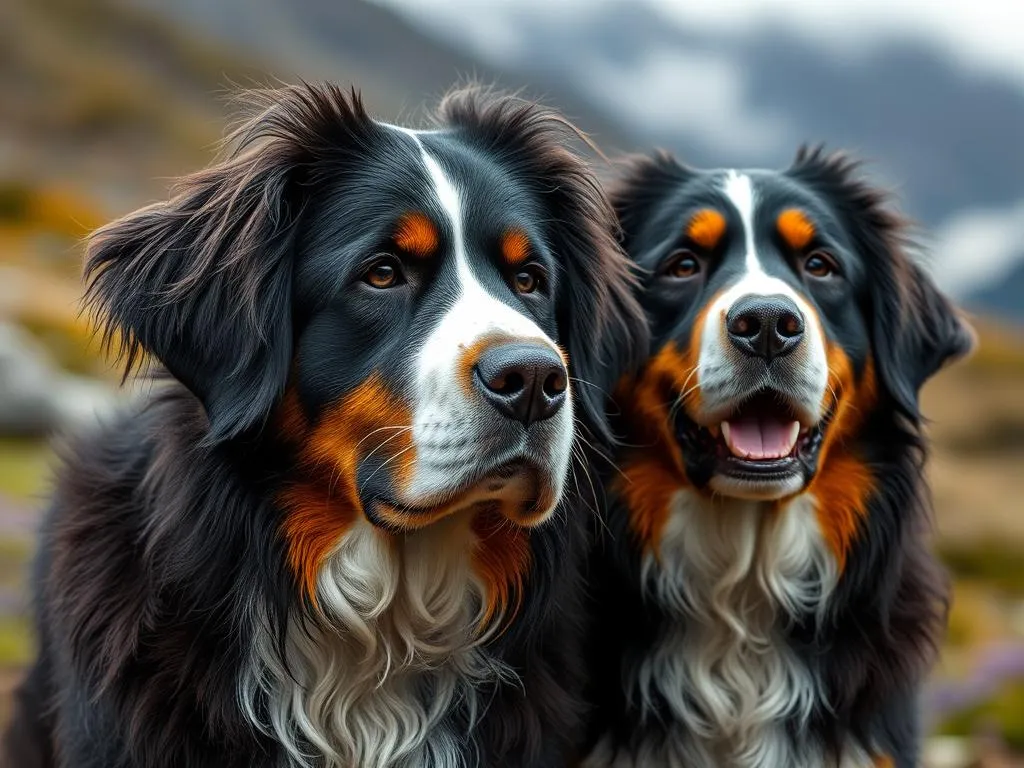
Bernese Mountain Dogs are a beloved breed known for their striking appearance and gentle temperament. With their tri-colored coats, large stature, and affectionate nature, these dogs have captured the hearts of many. To fully appreciate the qualities of the Bernese Mountain Dog, it’s essential to delve into their history and understand what were Bernese Mountain Dogs bred for.
Understanding a breed’s purpose can help potential owners make informed decisions and provide the best care possible. This article will explore the historical background, characteristics, modern uses, lifestyle considerations, training, and common questions related to Bernese Mountain Dogs.
Historical Background
Origins of the Bernese Mountain Dog
The Bernese Mountain Dog hails from the picturesque region of Switzerland, specifically the canton of Bern. The breed is believed to have descended from ancient Mastiff-type dogs brought to Switzerland by Roman legions. Over time, these dogs were crossed with local herding breeds, resulting in the robust and versatile Bernese Mountain Dog we know today.
The breed was officially recognized in the early 20th century, and efforts were made to standardize its characteristics. The Bernese Mountain Dog is one of four Swiss mountain dog breeds, each with unique traits, but all share a common ancestry.
Early Uses of the Breed
Originally, Bernese Mountain Dogs were invaluable to farmers in the Swiss countryside. Their primary roles included:
- Herding Livestock: These dogs were adept at managing cattle, sheep, and goats, ensuring they remained safe and accounted for.
- Guarding: The breed’s protective nature made them excellent guardians for both livestock and property, deterring potential threats.
- Draft Work: Bernese Mountain Dogs were also used as draft animals, pulling carts loaded with goods to and from markets. Their strength and stamina were crucial for transporting heavy loads in the rugged Swiss terrain.
Characteristics of the Bernese Mountain Dog
Physical Traits
Bernese Mountain Dogs are large, sturdy dogs with distinct physical features:
- Size and Weight: Males typically weigh between 80-115 pounds, while females range from 70-95 pounds. Their height usually falls between 23 to 28 inches at the shoulder.
- Coat Color and Texture: They have a long, thick double coat that consists of black fur with white and rust markings. The coat is designed to withstand cold weather conditions, a trait stemming from their alpine origins.
- Distinctive Features: Their expressive eyes, bushy tails, and characteristic markings, including a white blaze on the face and white paws, make them easily recognizable.
Temperament
The personality of a Bernese Mountain Dog is as charming as its appearance:
- General Personality Traits: They are known for being gentle, affectionate, and loyal. Their calm demeanor makes them excellent family pets.
- Social Behavior: Bernese Mountain Dogs are friendly and get along well with children and other pets. Their social nature makes them eager to be part of family activities and interactions.
- Intelligence and Trainability: While intelligent, they can also be somewhat independent. This means that consistent training and positive reinforcement are essential for effective obedience.
Modern Uses of Bernese Mountain Dogs
Family Companions
In today’s world, Bernese Mountain Dogs primarily serve as family companions. Their affectionate nature makes them particularly well-suited for family life:
- Adaptability to Family Life: They thrive in environments where they are included in family activities and enjoy spending time with their human companions.
- Interaction with Children and Other Pets: Their gentle and patient demeanor makes them great playmates for children. They are typically friendly with other animals, although early socialization is crucial.
Working Roles Today
While they are primarily family pets, many Bernese Mountain Dogs still serve in various working roles:
- Therapy and Assistance Dogs: Their calm and nurturing disposition allows them to excel as therapy dogs, providing comfort and support to those in need.
- Participation in Dog Sports: Many Bernese Mountain Dogs enjoy engaging in dog sports, such as agility and obedience competitions, showcasing their intelligence and athleticism.
Popularity in Urban Settings
As urban living becomes more common, Bernese Mountain Dogs have adapted well, although certain considerations are necessary:
- Adaptation to City Living: While they can thrive in urban settings, they require ample exercise and mental stimulation, which can often be a challenge in smaller living spaces.
- Need for Space and Exercise Considerations: Owners must ensure that they provide sufficient exercise, such as daily walks and playtime, to keep these dogs healthy and happy.
Lifestyle Considerations for Bernese Mountain Dog Owners
Exercise Requirements
Maintaining a healthy lifestyle for Bernese Mountain Dogs involves understanding their exercise needs:
- Daily Exercise Needs: Adults typically require at least 1 hour of exercise daily. This can include walks, playtime, and interactive games.
- Recommended Activities: Activities such as hiking, swimming, and obedience training can provide both physical and mental stimulation, which is vital for their overall well-being.
Grooming and Maintenance
A well-groomed Bernese Mountain Dog is a happy dog. Here are some grooming considerations:
- Coat Care: They shed throughout the year, with heavier shedding occurring in spring and fall. Regular brushing (at least once a week) is essential to keep their coats healthy and free of mats.
- Health Considerations: Common health issues include hip dysplasia, elbow dysplasia, and certain types of cancers. Regular vet check-ups and maintaining a healthy weight are crucial.
Nutrition and Diet
Proper nutrition plays a significant role in a Bernese Mountain Dog’s health:
- Dietary Needs for Different Life Stages: Puppies require a nutrient-rich diet to support their growth, while adult and senior dogs have different caloric needs.
- Recommended Food Types: High-quality dog food formulated for large breeds is recommended. Consulting with a veterinarian can help tailor a diet to individual health needs.
Training and Socialization
Importance of Early Training
Training and socialization are critical for the development of a well-adjusted Bernese Mountain Dog:
- Benefits of Early Socialization: Early exposure to various people, environments, and other animals can help prevent behavioral issues and foster a confident dog.
- Recommended Training Techniques: Positive reinforcement, consistency, and patience are key when training. Basic obedience commands should be taught early on.
Common Behavioral Traits
Like any breed, Bernese Mountain Dogs can exhibit certain behavioral challenges:
- Challenges Faced by Owners: Some owners may find their dog to be stubborn or prone to separation anxiety if left alone for extended periods.
- Tips for Managing Specific Behaviors: Providing mental stimulation through puzzle toys, regular interaction, and enforcing boundaries can help manage common behavioral issues.
Conclusion
In summary, the Bernese Mountain Dog is a breed rich in history and purpose. Originally bred for herding, guarding, and draft work, they have transitioned beautifully into modern family life while still fulfilling various working roles. Understanding what were Bernese Mountain Dogs bred for allows prospective owners to appreciate their unique needs and characteristics.
Owning a Bernese Mountain Dog comes with responsibilities, including proper training, socialization, and meeting their exercise and grooming needs. For those willing to invest time and love, a Bernese Mountain Dog can be a loyal and affectionate companion, enriching your life with their gentle spirit.
Frequently Asked Questions (FAQs)
Are Bernese Mountain Dogs good for first-time dog owners?
Yes, with proper training and socialization, Bernese Mountain Dogs can be excellent for first-time owners, providing their gentle nature and eagerness to please.
What is the lifespan of a Bernese Mountain Dog?
The average lifespan of a Bernese Mountain Dog is around 7 to 10 years, though some may live longer with good care.
Do Bernese Mountain Dogs have any common health issues?
Yes, they are prone to some health concerns, including hip and elbow dysplasia, certain cancers, and heart issues. Regular vet check-ups can help detect any problems early.
How much exercise do Bernese Mountain Dogs need daily?
Bernese Mountain Dogs typically require at least 1 hour of exercise daily, which can include walks, playtime, and other activities to keep them mentally and physically stimulated.









